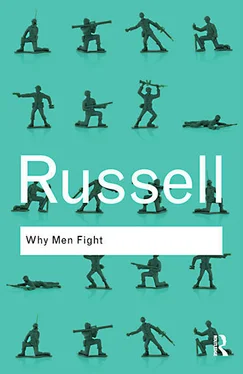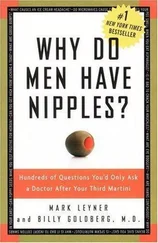Bertrand Russell - Why Men Fight
Здесь есть возможность читать онлайн «Bertrand Russell - Why Men Fight» весь текст электронной книги совершенно бесплатно (целиком полную версию без сокращений). В некоторых случаях можно слушать аудио, скачать через торрент в формате fb2 и присутствует краткое содержание. Город: London, Год выпуска: 2010, ISBN: 2010, Издательство: Routledge, Жанр: Философия, Публицистика, на английском языке. Описание произведения, (предисловие) а так же отзывы посетителей доступны на портале библиотеки ЛибКат.
- Название:Why Men Fight
- Автор:
- Издательство:Routledge
- Жанр:
- Год:2010
- Город:London
- ISBN:978-0-203-86469-2
- Рейтинг книги:3 / 5. Голосов: 1
-
Избранное:Добавить в избранное
- Отзывы:
-
Ваша оценка:
- 60
- 1
- 2
- 3
- 4
- 5
Why Men Fight: краткое содержание, описание и аннотация
Предлагаем к чтению аннотацию, описание, краткое содержание или предисловие (зависит от того, что написал сам автор книги «Why Men Fight»). Если вы не нашли необходимую информацию о книге — напишите в комментариях, мы постараемся отыскать её.
— discusses war, pacifism, reason, impulse and personal liberty, and greatly contributed to Russells fame as a formidable social critic and anti-war activist.
“The supreme principle, both in politics and in private life, should be to promote all that is creative, and so to diminish the impulses and desires that centre around possession.”
Bertrand Russell “Russell is one of the most profound thinkers of the modern age.”
The New York Times
Why Men Fight — читать онлайн бесплатно полную книгу (весь текст) целиком
Ниже представлен текст книги, разбитый по страницам. Система сохранения места последней прочитанной страницы, позволяет с удобством читать онлайн бесплатно книгу «Why Men Fight», без необходимости каждый раз заново искать на чём Вы остановились. Поставьте закладку, и сможете в любой момент перейти на страницу, на которой закончили чтение.
Интервал:
Закладка:
The life of the mind, although supremely excellent in itself, cannot bring health into the life of instinct, except when it results in a not too difficult outlet for the instinct of creation. In other cases it is, as a rule, too widely separated from instinct, too detached, too destitute of inward growth, to afford either a vehicle for instinct or a means of subtilizing and refining it. Thought is in its essence impersonal and detached, instinct is in its essence personal and tied to particular circumstances: between the two, unless both reach a high level, there is a war which is not easily appeased. This is the fundamental reason for vitalism, futurism, pragmatism, and the various other philosophies which advertise themselves as vigorous and virile. All these represent the attempt to find a mode of thought which shall not be hostile to instinct. The attempt, in itself, is deserving of praise, but the solution offered is far too facile. What is proposed amounts to a subordination of thought to instinct, a refusal to allow thought to achieve its own ideal. Thought which does not rise above what is personal is not thought in any true sense: it is merely a more or less intelligent use of instinct. It is thought and spirit that raise man above the level of the brutes. By discarding them we may lose the proper excellence of men, but cannot acquire the excellence of animals. Thought must achieve its full growth before a reconciliation with instinct is attempted.
When refined thought and unrefined instinct coexist, as they do in many intellectual men, the result is a complete disbelief in any important good to be achieved by the help of instinct. According to their disposition, some such men will as far as possible discard instinct and become ascetic, while others will accept it as a necessity, leaving it degraded and separated from all that is really important in their lives. Either of these courses prevents instinct from remaining vital, or from being a bond with others; either produces a sense of physical solitude, a gulf across which the minds and spirits of others may speak, but not their instincts. To very many men, the instinct of patriotism, when the war broke out, was the first instinct that had bridged the gulf, the first that had made them feel a really profound unity with others. This instinct, just because, in its intense form, it was new and unfamiliar, had remained uninfected by thought, not paralysed or devitalized by doubt and cold detachment. The sense of unity which it brought is capable of being brought by the instinctive life of more normal times, if thought and spirit are not hostile to it. And so long as this sense of unity is absent, instinct and spirit cannot be in harmony, nor can the life of the community have vigour and the seeds of new growth.
The life of the mind, because of its detachment, tends to separate a man inwardly from other men, so long as it is not balanced by the life of the spirit. For this reason, mind without spirit can render instinct corrupt or atrophied, but cannot add any excellence to the life of instinct. On this ground, some men are hostile to thought. But no good purpose is served by trying to prevent the growth of thought, which has its own insistence, and if checked in the directions in which it tends naturally, will turn into other directions where it is more harmful. And thought is in itself God-like: if the opposition between thought and instinct were irreconcilable, it would be thought that ought to conquer. But the opposition is not irreconcilable: all that is necessary is that both thought and instinct should be informed by the life of the spirit.
In order that human life should have vigour, it is necessary for the instinctive impulses to be strong and direct; but in order that human life should be good, these impulses must be dominated and controlled by desires less personal and ruthless, less liable to lead to conflict than those that are inspired by instinct alone. Something impersonal and universal is needed over and above what springs out of the principle of individual growth. It is this that is given by the life of the spirit.
Patriotism affords an example of the kind of control which is needed. Patriotism is compounded out of a number of instinctive feelings and impulses: love of home, love of those whose ways and outlook resemble our own, the impulse to co-operation in a group, the sense of pride in the achievements of one’s group. All these impulses and desires, like everything belonging to the life of instinct, are personal, in the sense that the feelings and actions which they inspire towards others are determined by the relation of those others to ourselves, not by what those others are intrinsically. All these impulses and desires unite to produce a love of a man’s own country which is more deeply implanted in the fibre of his being, and more closely united to his vital force, than any love not rooted in instinct. But if spirit does not enter in to generalize love of country, the exclusiveness of instinctive love makes it a source of hatred of other countries. What spirit can effect is to make us realize that other countries equally are worthy of love, that the vital warmth which makes us love our own country reveals to us that it deserves to be loved, and that only the poverty of our nature prevents us from loving all countries as we love our own. In this way instinctive love can be extended in imagination, and a sense of the value of all mankind can grow up, which is more living and intense than any that is possible to those whose instinctive love is weak. Mind can only show us that it is irrational to love our own country best; it can weaken patriotism, but cannot strengthen the love of all mankind. Spirit alone can do this, by extending and universalizing the love that is born of instinct. And in doing this it checks and purifies whatever is insistent or ruthless or oppressively personal in the life of instinct.
The same extension through spirit is necessary with other instinctive loves, if they are not to be enfeebled or corrupted by thought. The love of husband and wife is capable of being a very good thing, and when men and women are sufficiently primitive, nothing but instinct and good fortune is needed to make it reach a certain limited perfection. But as thought begins to assert its right to criticize instinct the old simplicity becomes impossible. The love of husband and wife, as unchecked instinct leaves it, is too narrow and personal to stand against the shafts of satire, until it is enriched by the life of the spirit. The romantic view of marriage, which our fathers and mothers professed to believe, will not survive an imaginative peregrination down a street of suburban villas, each containing its couple, each couple having congratulated themselves as they first crossed the threshold, that here they could love in peace, without interruption from others, without contact with the cold outside world. The separateness and stuffiness, the fine names for cowardices and timid vanities, that are shut within the four walls of thousands upon thousands of little villas, present themselves coldly and mercilessly to those in whom mind is dominant at the expense of spirit.
Nothing is good in the life of a human being except the very best that his nature can achieve. As men advance, things which have been good cease to be good, merely because something better is possible. So it is with the life of instinct: for those whose mental life is strong, much that was really good while mind remained less developed has now become bad merely through the greater degree of truth in their outlook on the world. The instinctive man in love feels that his emotion is unique, that the lady of his heart has perfections such as no other woman ever equalled. The man who has acquired the power of impersonal thought realizes, when he is in love, that he is one of so many millions of men who are in love at this moment, that not more than one of all the millions can be right in thinking his love supreme, and that it is not likely that that one is oneself. He perceives that the state of being in love in those whose instinct is unaffected by thought or spirit, is a state of illusion, serving the ends of Nature and making a man a slave to the life of the species, not a willing minister to the impersonal ends which he sees to be good. Thought rejects this slavery; for no end that Nature may have in view will thought abdicate, or forgo its right to think truly. “Better the world should perish than that I or any other human being should believe a lie”—this is the religion of thought, in whose scorching flames the dross of the world is being burnt away. It is a good religion, and its work of destruction must be completed. But it is not all that man has need of. New growth must come after the destruction, and new growth can come only through the spirit.
Читать дальшеИнтервал:
Закладка:
Похожие книги на «Why Men Fight»
Представляем Вашему вниманию похожие книги на «Why Men Fight» списком для выбора. Мы отобрали схожую по названию и смыслу литературу в надежде предоставить читателям больше вариантов отыскать новые, интересные, ещё непрочитанные произведения.
Обсуждение, отзывы о книге «Why Men Fight» и просто собственные мнения читателей. Оставьте ваши комментарии, напишите, что Вы думаете о произведении, его смысле или главных героях. Укажите что конкретно понравилось, а что нет, и почему Вы так считаете.












